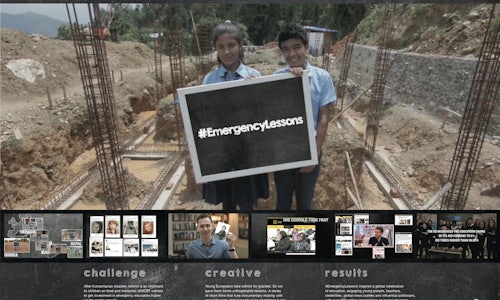

War, natural disasters and disease outbreaks have disrupted the lives – and educations – of over 75 million children around the world.
Without education, children are at risk of trafficking, exploitation and extremism. Their childhoods may be lost to child labour, child marriage or recruitment by armed groups.
Yet most people don't appreciate the importance of school in conflicts or humanitarian disasters: it can provide consistency, normalcy, and a safe space to affected children.
UNICEF promotes the rights and wellbeing of every child around the world. With its partners, UNICEF works in 190 countries and territories to reach the most vulnerable and excluded children.
UNICEF partnered with the European Commission – Directorate General for European Civil Protection and Humanitarian Aid Operations (ECHO) to highlight the important of education in emergencies and in protracted crises.
Our role was to get this issue higher up the public and governmental investment, in seven European markets, based on countries where UNICEF and ECHO had existing partnerships relating to education in emergencies: Greece, Hungary, Ireland, Italy, Slovenia, Slovakia, and the UK.
Specifically, we aimed to actively engage the support of over 1 million European under-25s – and reach over 20m young Europeans.
Our research within critically affected countries (including Sudan, Ukraine, Guinea, Iraq) revealed seven critical things school gives children: protection, friendship, healthcare provisions, routine and stability, psychosocial support, social skills and hope.
We wanted to share these qualities of school with the world, in a way that would capture people's attention and provoke emotion.
The overwhelming enthusiasm of the children was what inspired our campaign. While Europeans see school as… well, a bit of a chore, for many of these children, school is overwhelmingly a positive experience.
So we'd give them some #EmergencyLesson.
At times when most young people are talking about school on social channels, we'd share the stories of the children who love it.
We created a series of seven short films that fuse documentary making with social thinking. Each follows the lives of children living through disaster, in Ukraine, Nepal, Guinea and Iraq.
Each lesson demonstrated a universal truth about school and ended with a relevant social assignment – from sharing an old school photo to nominating a best friend or teacher from school.
The stories would be used as social content as well as form part of a teaching pack to be used in the classrooms of junior and senior schools. And ultimately would be broadcast in front of the European Parliament.
We shot the seven films at schools in Ukraine, Iraq, Guinea and Nepal. Our team travelled to these countries, met with children who had lived through emergencies and filmed their authentic stories based on the theme most relevant to the support they have received from UNICEF and ECHO.
The campaign launched in conjunction with the World Humanitarian Summit in May 2016 and the #EmergencyLessons videos were released one a month (with a summer holiday break in August!) from May to December, leading up to a closing event in the European Parliament.
We also developed a schools pack in seven languages, including details of the campaign and the countries featured in the videos, and lesson plans and assembly outlines for primary and secondary students, from the inventive ways in which teachers in disaster zones teach, to a deeper look at the effects of emergencies on children, and why school is so important in helping them cope with trauma.
The fusion of documentary making and social thinking resulted in a global celebration of school, engaging everyone from young people to teachers, celebrities and influential politicians. #EmergencyLessons reached over 700 million impressions across social channels alone, and was covered by more than 50 major digital and broadcast media news outlets.
There were 83,000 mentions across social channels: thousands of people shared school photos, nominated their favourite teacher, best school friends, their favourite subject, and more, including celebrities such as Liam Neeson, Robert Downey Junior and Mark Ruffalo, and high-profile politicians such as Jean-Claude Juncker.
A total of 699 European schools took part, using our school packs and the films as educational resources to teach lessons about the importance of education in emergencies.
A survey at the end of the campaign showed that 38% of people in the seven target countries were aware of the campaign.
During the campaign, the European Union announced it would increase the education share of its aid funding in 2017 to 6% – six times higher than in 2014. More than $97 million in EU humanitarian aid has so far been allocated for education in emergencies projects, benefitting over 3.8 million children in 47 countries.
